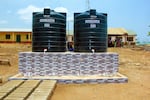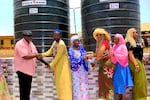In August 2023, Portlander Heather Coleman Cox made a long-awaited trip to visit Ghana. It was a lifelong goal of hers to visit the country after she became curious as a child reading books about Africa that her mother brought home.
She was amazed by what she saw in Ghana, but also bothered by the lack of resources.
Along with local allies, She established the foundation G.A.V.E (Ghana Aquaventure Emmanuel Foundation) with a mission to bring water to the villages. She’s been able to provide water to the villages of Janikura and Larabanga and she’s looking to do more.
OPB’s Paul Marshall spoke with Heather Coleman Cox about the foundation.
Paul Marshall: You were able to bring water to the villages. How does that happen?
Heather Coleman-Cox: First you get a quote from a borehole driller. A borehole is another name for a well. Once you pay that for the borehole, the hydrogeologist will come out to the site and determine the best place to start drilling.
After that, the borehole driller trucks arrive on site and they commence to put these, I would say about 6 ft long poles down into the location that has been identified to drill on or to drill at. They go down until they get to the water source that they determine is good. You’ll see them feeding pipes down into a hole and then all of a sudden water will start gushing out. That’s your sign that you have hit the water. Once they hit the water, then the project is halfway done.
My water solution project not only includes a bore hole and a water pump but also water storage tanks, a solar panel and the platform to hold the 8000 L water storage tank.
Marshall: You mentioned the walk from each village to get water. How long was the walk?
Coleman-Cox: It’s going to be different for each village. The first two villages that I worked with the walk took at least three hours. Three kilometers for the second village so that’s about an hour 15 or an hour and 20 minute walk.
The problem is that these women are carrying dirty clothes. They’re carrying big empty bowls that they can fill up with water. They have to walk back and be careful not to spill any water. In another village that I worked with the walk is three hours. It depends on the location of the village to where there is a well. It’s a very arduous task.

Water storage tank in the Larabanga village of Ghana
Heather Coleman-Cox
Marshall: You started with those two villages first (Janikura and Larabanga)) but then expanded from there. What changed for you?
Coleman-Cox: Initially my project was just the borehole and the pump to just bring the water. The Janikura Village contacted me after I set that up and they’re like we really need water storage tanks because we’re sharing this water with neighboring villages.
Then Janikura came back and said their pump had stopped operating. It stopped pumping and it wasn’t just due to electricity, it just malfunctioned. Instead of replacing the pump, I also had the vendor install solar panels because they are very reliant on electricity and they have rolling blackouts. They can have a blackout last for days and they never know when they’re going to happen.
Their electric grid is severely overtaxed so it became necessary to install solar panels to remove that reliance on electricity.

GAVE Founder Heather Coleman Cox (red shirt and hat) meeting with villagers next to the water tanks
Heather Coleman-Cox
Marshall: You wanted to go to Ghana since you were very little. What inspired that interest?
Coleman-Cox: Ever since I was about six or seven years old. I came across a magazine article on Emmett Till, and as we know Emmett Till was a young African American who went from Chicago down South to visit his family and he was accused of whistling at a Caucasian woman. As a result, he was severely beaten, tortured and murdered. I remember looking in the “Jet” magazine that my mom had accumulated. She had quite a collection. Being horrified as a child and just understanding from there that Black people in America were treated differently piqued my interest.
My mother was a Black history historian and so that was all instilled in me. I always had a desire to go back to the motherland and visit and just be there and experience where I came from. There’ve been so many conversations that I have been in with other races and they’re able to say, oh, my great grandfather from Germany or my great grandfather is from France or we’re from Canada. As an African American, many of us don’t know exactly where in Africa we came from.
Marshall: What was it like the first time you actually set foot there?
Coleman-Cox: It was a nine hour flight from Oregon to the Netherlands and then from the Netherlands to Ghana. It didn’t even feel that way because I was so excited. I wasn’t sitting on the plane like this is taking forever. I was on pins and needles the closer we got.
Once we landed, I told everybody I’m letting my feet feel the pavement. It’s going to be such a magical experience and that’s exactly how it was. When I got settled in the hotel, I went outside barefoot, I walked around and it just felt amazing.
One of the excursions that we went to was called the Last Bath and this is where they took the slaves that they kept captured and let them clean themselves off before they were being shipped to one of the castles that was going to take them across the Middle Passage. It was life changing and it just really made me feel connected to the country and connected to my ancestors. It’s just an overwhelming and exhilarating feeling.
Marshall: You’re a person of faith and it remains a guiding principle for you. Is there a scripture or passage that helps to guide your work ?
Coleman-Cox: In Galatians 3:8, it says that in you all nations will be blessed. In the New Testament, Paul was telling the Galatians what God told Abraham. To me means that each person can contribute to blessing other nations. We all are to have some type of ministry and it just so happens that my ministry is helping to end the walk for water and bring clean sustainable water into villages in Ghana that do not have water. With my foundation GAVE, we feel like having access to water is not a privilege, it’s a fundamental human, right? That’s why we are working to bring water to these villages.
It’s just natural that every person should have at the very least access to sustainable water.
